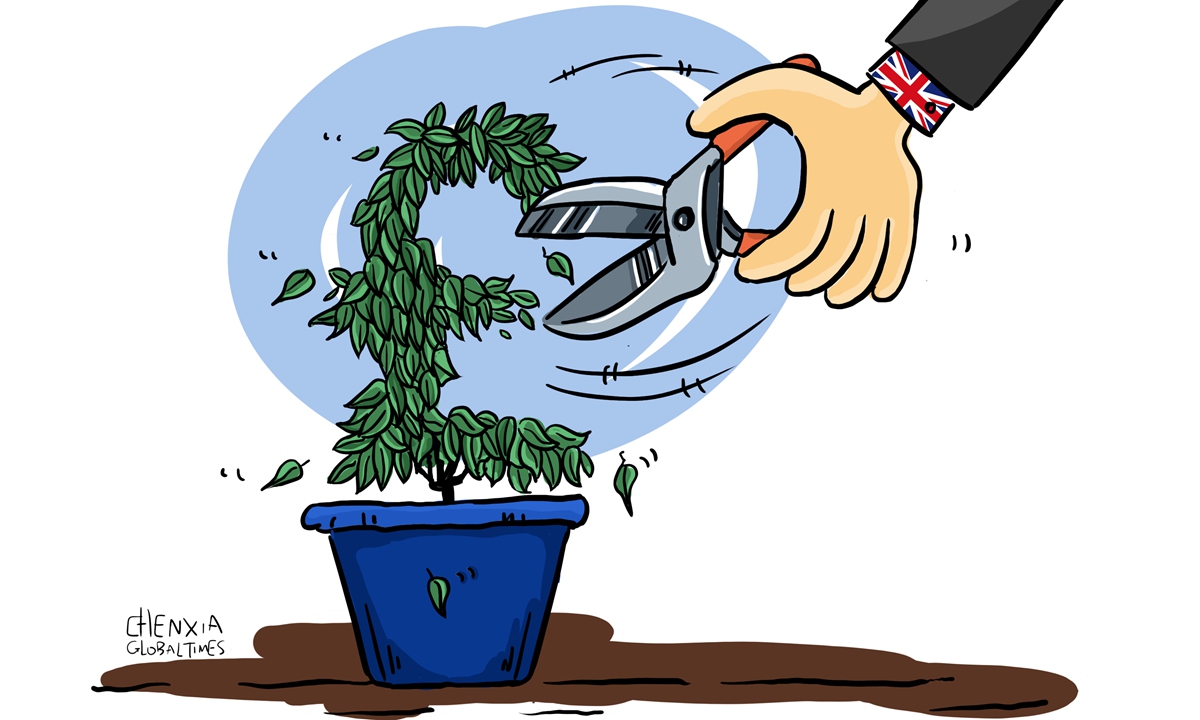London buries ‘Golden Era’ of friendly interactions with China
By Li Hong Source: Global Times Published: 2020/7/19 17:09:10

Illustration: Chen Xia/GT
The British government's latest move to strip Huawei Technologies from the country's 5G networks by 2027 is a very bad decision that shows London is kowtowing to coercion from the Trump administration, and brazenly discriminating against a Chinese private high-tech company.By shunning Huawei, Britain is shooting itself in the foot by sacrificing its 5G rollout, which will inevitably enlarge its digital divide with other major economies such as Germany and France.
Britain also risks ruining many years of fruitful economic and trade relations with China, which the previous UK government of David Cameron described as entering a "Golden Era."
The action against Huawei will prompt other Chinese companies to think twice before making an investment in Britain, if they are concerned that politics-induced differentiation and discrimination could get in the way.
And, China is likely to respond with a tit-for-tat measure.
Jaguar Land Rover, Britain's largest automaker, which makes a fifth of its sales in this country, could be a target. Chinese students who have planned to apply to study at British schools and Chinese tourists will certainly reconsider their plans to go to Britain, due to the UK government's increasing unfriendliness toward China. When these numbers are cut in half or more, London will feel the economic pain.
After all, China's economy is nearly six times of that of Britain, which increasingly looks like a loner after it voted to walk into oblivion by exiting the mighty European Union.
Beijing will surely reconsider its relationship with London carefully and comprehensively. If the government of Boris Johnson was truly forced to make the decision under extreme pressure from Washington, and if London is willing to reverse the Huawei decision in a few months, China could give London a grace period before taking reciprocal retaliatory measures.
Unlike the current US government which has pursed unilateral "America First" foreign policy and trade protectionism, and bullied countries big and small, China wants to be friendly with all its trade partners - provided the partners treat China equally and faithfully.
During the past four decades, China has spearheaded global economic integration, free trade and win-win, encouraging businesses to cooperate on the basis of open, fair, transparent, and non-discriminatory interaction and competition.
Huawei grew from a private telecom upstart in 1980s to become a multinational technology conglomerate now, with an innovative edge in 4G and 5G. The company has assisted China, and many other partner countries in the world, to reap big dividends through developing their digital economy by powering social media, e-commerce, paperless mobile payments, industrial robotics and artificial intelligence.
When China's cities and vast rural regions are linked by 3 to 4 million Huawei 5G base stations over the next few years, it is very likely that revolutionary new products and efficient models of doing business, such as self-driving cars and intelligent household appliances, will help unleash waves of unprecedented productivity and prosperity.
The rise of Huawei has irked the US government, because it cannot put up with a Chinese high-tech company leading global 5G innovations and dwarfing the US in future technologies which it sees as threatening its hegemony.
The current US government is adamant about decimating Huawei, and has moved to cut off crucial microchip supplies to it. Now, it is forcing its traditional allies like Australia and UK to alienate the Chinese company.
This subservience to the US, has lead Boris Johnson's administration, to tear up a 20-year partnership with Huawei that has angered tens of millions of Chinese people, because the deed is nothing but "pure discrimination" against this country.
A boycott of British brands, such as Burberry, Jaguar Land Rover and a spate of UK schools could be likely options for Chinese consumers if London does not reverse its decision.
"The way you are treating Huawei is being followed very closely by other Chinese businesses, and it will be difficult for other businesses to have the confidence to invest more in Britain," said Chinese ambassador Liu Xiaoming.
As London has not signed a post-Brexit trade deal with the European Union, it is pursuing a trade agreement with China - a major exporting destination for Britain. To righteously respond to Johnson's hardening decision on Huawei, China could move to slow down or suspend the trade talks.
Only when British politicians feel the pinch of their economy, stranded in a protracted limbo and its jobless rate shooting to the sky, will they know the stupidity of ousting Huawei.
The author is an editor with the Global Times. bizopinion@globaltimes.com.cn
Posted in: COLUMNISTS